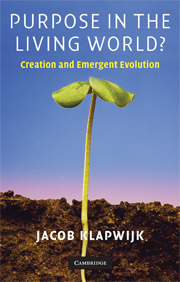Book contents
- Frontmatter
- Contents
- List of figures
- Preface
- Introduction
- 1 Does life on earth have a purpose?
- 2 Creationism, Intelligent Design, and Augustine's idea of time
- 3 Darwin, neo-Darwinism, and the naturalistic continuity claim
- 4 Miller's pre-biotic broth and the premises of evolutionism
- 5 A cold shudder along Darwin's back
- 6 The emergence theory of Morgan and Alexander
- 7 Luctor et emergo: what is emergent evolution?
- 8 Toward a general theory of emergent evolution
- 9 Hominization and the philosophy of mind
- 10 Augustinian faith and evolutionary science
- 11 The organism is a whole. The world is a habitat
- 12 The slumbering temptation of essentialism
- 13 Questions surrounding the emergence process
- 14 Enkapsis in nature. Is there an Omega point?
- Bibliography
- Index
13 - Questions surrounding the emergence process
Published online by Cambridge University Press: 05 June 2012
- Frontmatter
- Contents
- List of figures
- Preface
- Introduction
- 1 Does life on earth have a purpose?
- 2 Creationism, Intelligent Design, and Augustine's idea of time
- 3 Darwin, neo-Darwinism, and the naturalistic continuity claim
- 4 Miller's pre-biotic broth and the premises of evolutionism
- 5 A cold shudder along Darwin's back
- 6 The emergence theory of Morgan and Alexander
- 7 Luctor et emergo: what is emergent evolution?
- 8 Toward a general theory of emergent evolution
- 9 Hominization and the philosophy of mind
- 10 Augustinian faith and evolutionary science
- 11 The organism is a whole. The world is a habitat
- 12 The slumbering temptation of essentialism
- 13 Questions surrounding the emergence process
- 14 Enkapsis in nature. Is there an Omega point?
- Bibliography
- Index
Summary
Evolutionary history progresses along an obstacle course. Who shall say how often nature, from the beginning of its cosmic origin, had to cross a hurdle to reach a new level of being? For the sake of clarity I have discussed, until now, no more than five ontological levels: the physical, the biotic, the vegetative, the sensitive, and the mental. With this I have pointed to the distinctive or leading functions of material things, bacteria, plants, animals, and human beings.
This fivefold division is in all probability far too simple a representation of the topic. It is likely that the process of emergent evolution proceeded in a more nuanced manner and requires much more philosophical analysis than can be offered here. In this chapter I want to call attention to a number of lacunae in this research. To begin, we have to take into account that there are more modal levels and thus also more ontological transitions in the evolutionary process than is indicated above (section 1). There is also a need for an additional analysis of what constitutes the irreplaceable value of the human person, and what is the relationship of spirit, soul, and body (section 2). Further discussion is also needed about the question of how the ontological profile of humans developed in the evolutionary process (section 3). Because naturalistic axioms often stand in our way, I conclude this chapter with a summons to more openness of spirit (section 4).
- Type
- Chapter
- Information
- Purpose in the Living World?Creation and Emergent Evolution, pp. 259 - 274Publisher: Cambridge University PressPrint publication year: 2008

